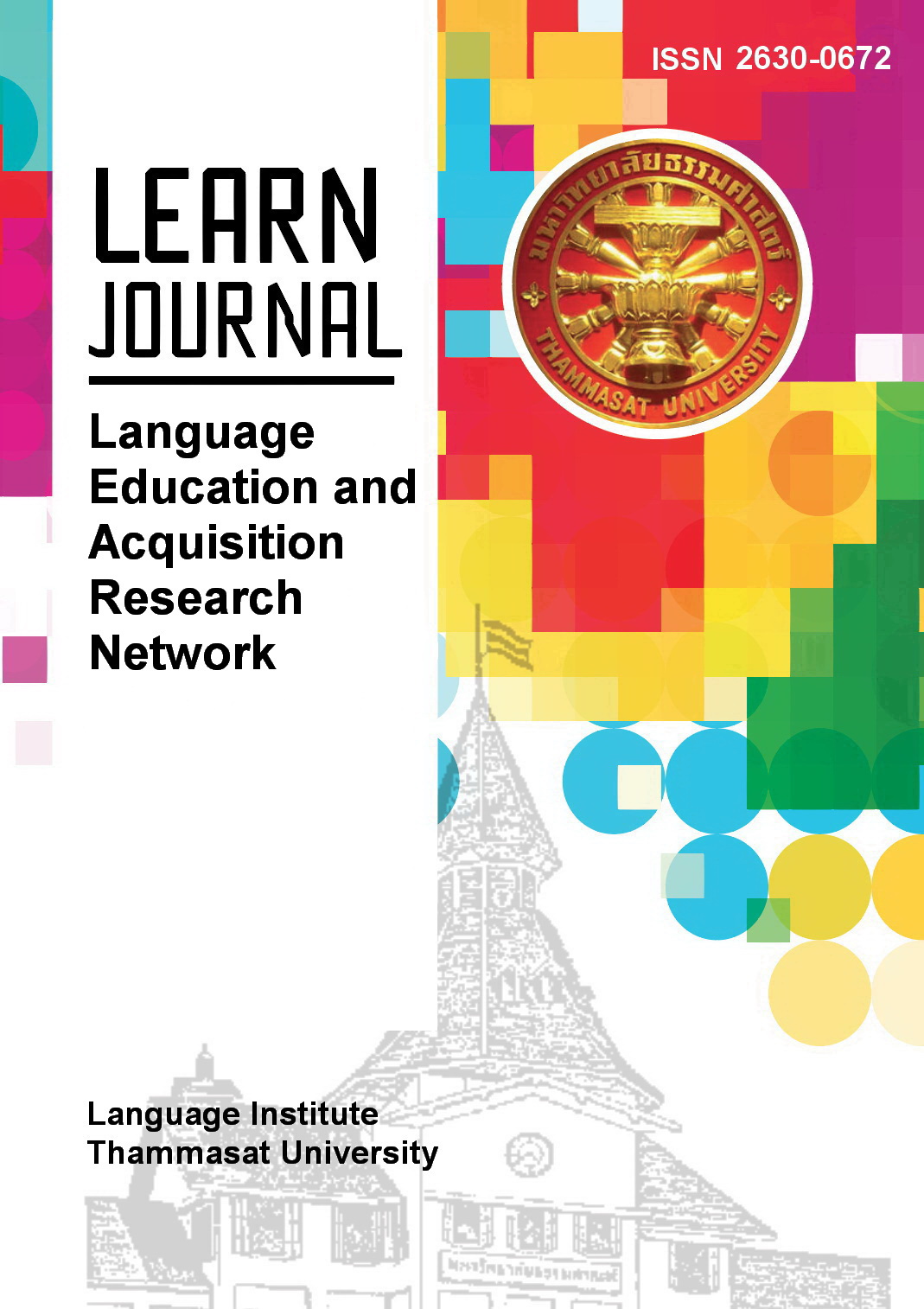Effects of Gamification in English Language Learning: The Implementation of Winner English in Secondary Education in Thailand
Main Article Content
Abstract
Accessing quality resources for English learning is an urgent pedagogical issue due to the lack of English teachers in Thailand. To compromise, it has become necessary to apply technology in English classes in the 21st century, through which students can access high-quality materials provided globally. Teachers need to tackle new challenges where the trends of technology and gamification in English language learning seem more appealing. This study explores how gamification contributes to student performance and perceptions through the Winner English program. The program was designed primarily to be self-paced but has been adapted to be used as a part of compulsory classes at school. The experiment group comprised Grade 9 students from eight Thai secondary schools, while the controlled group from the other eight schools studied English classes traditionally. The posttest results indicate a vast improvement to English performance by the experiment group once the program was integrated into English classes. Individual feedback underlined how the program was supported through gamification, such as the reward system and leaderboards, and offered an excellent opportunity to practice English accurately. Gamification shows promising attributes for English learners whose learning behaviors have become ubiquitous, fun-loving, and autonomous. Understanding the benefits of gamification could spark cautious optimism in English education in Thailand.
Article Details
References
Aguilera-Hermida, A.P. (2020). College students’ use and acceptance of
emergency online learning due to Covid-19. International Journal of Educational Research Open, 1(1), 1-8. https://doi.org/10.1016/j.ijedro.2020.100011
Alchamdani, A., Fatmasari, Anugrah E. R., Putri Sari, N., Putri, F. & Astina,
A. (2020). The impact of Covid-19 on online learning process in the college at Southeast Sulawesi. Jurnal Kesehatan Lingkungan, 12(1), 129-136. http://doi.org/10.20473/jkl.v12i1si.2020.129-136
Alimi, K. F., Ayob, A. H., Abdullah, A. R., Sultan, F. M. M., & Karuppannan,
G. (2021). Effectiveness of English language E-learning among tertiary education students during the COVID-19 pandemic. 3L: Southeast Asian Journal of English Language Studies, 27(4), 56-71. http://doi.org/10.17576/3L-2021-2704-05
Anwar, A., Mansoor, H., Faisal, D. & Khan, H.S. (2020). E-Learning amid
the COVID-19 Lockdown: Standpoint of medical and dental undergraduates. Pakistan Journal of Medical Science, 37(1), 217-222. https://doi.org/10.12669/pjms.37.1.3124
Ašeriškis, D., & Damaševičius, R. (2014). Gamification patterns for
gamification applications. Procedia Computer Science, 39, 83-90.
Deterding, S. (2012). Gamification: Designing for motivation.
Interactions, 19(4), 14-17.
Gee, J. P. (2008). Learning and games in The Ecology of Games:
Connecting Youth, Games, and Learning. Edited by Katie Salen. Cambridge. The MIT Press. 21-40. https://doi.org/10.1162/dmal.9780262693646.021
Heidary, S. (2021). The comparative analysis of using direct vs. indirect instruction of communication strategies on the naturalness of Iranian intermediate EFL learners’ oral performance. International Journal of Multidisciplinary and Current Research, 9, 247-253. https://doi.org/10.14741/ijmcr/v.9.3.8
Hue Dung, D.T. (2020). The advantages and disadvantages of virtual
learning. Journal of Research & Method in Education, 10(2), 45-48. http://doi.org/10.9790/7388-1003054548
Jayara, S. (2020). The advantages and disadvantages of online teaching in
medical education. Journal of Medical Evidence, 1(2), 144-146. http://doi.org/10.4103/JME.JME_159_20
Jo‘rayev, V. T. (2020). The role and advantages of distance courses in the
innovative educational system. The American Journal of Social Science and Education Innovations, 2(10), 434-439. https://doi.org/10.37547/tajssei/Volume02Issue10-70
Kapp, K. (2012). The gamification of learning and instruction: Game-
based methods and strategies for training and education. Pfeiffer.
Kiryakova, G., Angelova, N., & Yordanova, L. (2014). Gamification in
education. Proceedings of 9th International Balkan Education and Science Conference.
Leung, F. K. (1998). The implications of Confucianism for education
today. Journal of Thought, 33(2), 25-36.
Marczewski, A. (2017). The ethics of gamification. XRDS: Crossroads, The
ACM Magazine for Students, 24(1), 56-59.
Nguyen, T. M. N. (2022). Effects of Using Computer-Based Activities in
teaching English speaking at a high school in Ho Chi Minh City, Vietnam. International Journal of TESOL & Education, 2(1), 190–212. https://doi.org/10.54855/ijte.222112
Oeamoum, N., & Sriwichai, C. (2020). Problems and needs in English
language teaching from the viewpoints of preservice English
teachers in Thailand. Asian Journal of Education and Training, 6(4), 592-601.
Office of the Basic Education Commission. (2008). Basic education core
curriculum BE 2551 (AD 2008). Ministry of Education.
Prasongsukarn, K. (2009). Validating the cultural value scale (CVSCALE): A
case study of Thailand. ABAC Journal, 29(2), 1-13.
Putri, R. S., Purwanto, A., Pramono, R., Asbari, M., Wijayanti, L.M. &
Hyun, C.C. (2020). Impact of the Covid-19 pandemic on online home learning: An explorative study of primary schools in Indonesia. International Journal of Advanced Science and Technology, 29(5), 4809-4818. http://sersc.org/journals/index.php/IJAST/article/view/13867
Rasmitadila, R., Widyasari, W., Humaira, M., Tambunan, A.,
Rachmadtullah, R., & Samsudin, A. (2020). Using blended learning approach (BLA) in inclusive education course: A study investigating teacher students’ perception. International Journal of Emerging Technologies in Learning (IJET), 15(2), 72-85.
Sheldon, Lee (2012). The multiplayer classroom: Designing coursework
as a game. Cengage Learning.
Shytov, A. (2018). Confucian ethics and the juvenile justice system in the
Thai institutional context. ASEAN Journal of Legal Studies, 1(1), 36-50
Scott, A., & Neustaedter, C. (2013). Analysis of gamification in
education. Surrey, BC, Canada, 8, 36.
Thai, N.T., De Wever, B. & Valcke, M. (2019). Face-to-Face, blended,
flipped, or online learning environment? Impact on learning performance and students’ cognitions. Journal of Computer Assisted Learning, 36(3), 1-15.
Topîrceanu, A. (2017). Gamified learning: A role-playing approach to
increase student in-class motivation. Procedia Computer Science, 112, 41-50.
Yu, D., & Deng, L. (2016). Automatic speech recognition. Springer.
Zylfiu, B.G. & Rasimi A. (2020). Challenges and advantages of online
learning: The case of Kosovo. International Journal of Management, 11(10), 1873-1880.


